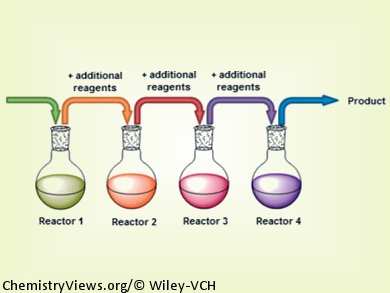The increased use of flow reactors could significantly improve the efficiency and optimization of chemical synthesis, argues Ian Baxendale, Durham University, UK.
Current, glassware-reliant working practices – many of which would be familiar to the chemist of a century ago – have notable disadvantages, including a lack of precision, the need for extensive purification, and limitations of scale. The advantages of flow-based chemical syntheses, meanwhile, include access to pressures and temperatures that are otherwise difficult to create, greater purity and direct in-line purification where necessary, increased flexibility of scale, and in particular the ability to perform real-time analysis and optimization.
Baxendale suggests that these features significantly assist chemists in synthesizing and testing products for a wide range of uses, from drugs to cosmetics to food, and predicts that as a result flow chemistry, already widely used in manufacture, will become an increasingly popular and valuable tool in small-scale laboratory research settings.
- The Integration of Flow Reactors into Synthetic Organic Chemistry,
I. R. Baxendale,
J. Chem. Technol. Biotechnol. 2013.
DOI: 10.1002/jctb.4012




